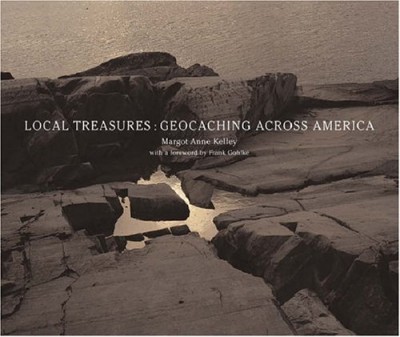 Local Treasures: Geocaching across America
Local Treasures: Geocaching across America
Center for American Places/ University of Chicago Press, 2006
ISBN 978-1930066366
In the spring of 2000, a man in Oregon hid a box of toys in the woods, posted the geographic coordinates of its location on a Web site, and issued a challenge for others to find it. People used their GPS receivers to find his treasure, and a new game was born. Today over a million people worldwide participate in geocaching, hiding stashes of trinkets in a variety of locations—from a grove of trees to a cliff ledge to the depths of a riverbed—and then inviting others to find them, leave a note, and swap a treasure of their own. In Local Treasures Margot Anne Kelley offers one of the first books on “geocaching,” exploring what compels ordinary people across the world to take part in these extraordinary treasure hunts.
Kelley traveled throughout the U.S. to chronicle the sites and stories of geocaching adventures, from the rocky coasts of Maine to the deserts surrounding Las Vegas to the starting point of the Mason-Dixon Line. Each striking, full-color photograph exposes a vision of America quite unlike that presented in a traditional guidebook: truly off the beaten path, these are non-idealized landscapes, often places with special meaning for the players alone. Kelley’s accompanying writings explore the world of geocaching communities, their rare ability to integrate new technologies with the natural world, and their complex and often ambivalent relationships to the surveillance technologies that sustain the game. In this era when people are increasingly disconnected from the land that surrounds them, geocaching offers an unusual and technologically savvy vision for the future. Kelley’s text is a fascinating examination of a new and creative diversion emerging from the intersection of the virtual world with the real.
